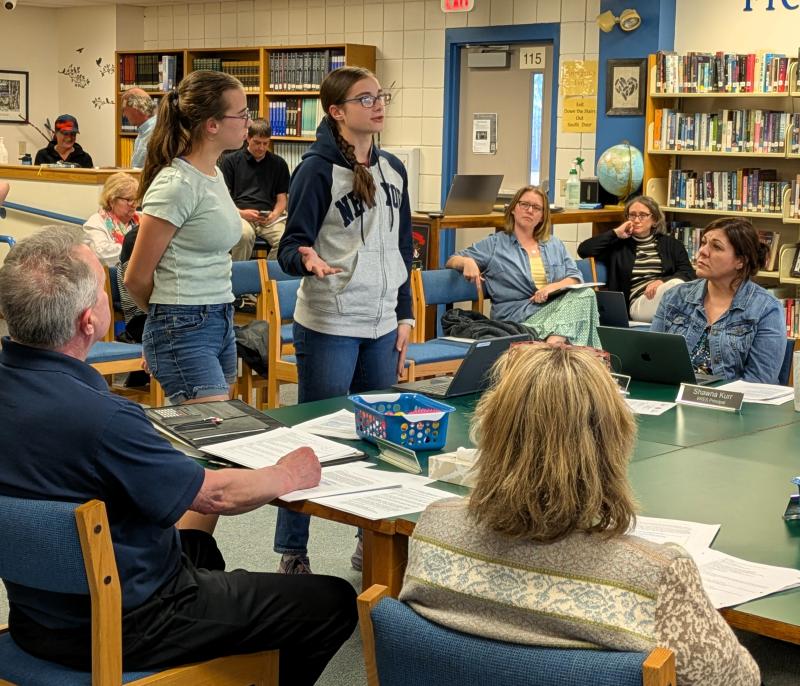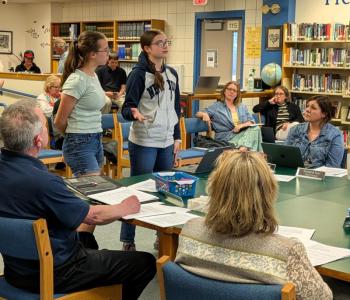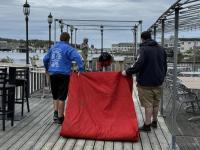CSD hears cell phone, environmental club proposals
Although Boothbay Region High School (BRHS) educator Dennis Dacus teaches health, he tried a social experiment this spring. Dacus asked students in his class to put their phones away in a pouch at the front of the room. By the second day, he saw something special.
“I heard conversation, and I never hear conversation,” he said.
Dacus said his students are usually quiet during breaks, silently using Snapchat or other apps on their phones. According to him, putting devices out of arm's reach had them making more human connections.
Dacus and BRHS Career Counselor Jim Wilkins came to the Community School District (CSD) School Committee May 13 with a 15-page proposal for cutting out cell phones for grades nine through 12. The proposal revolved around the use of a Yondr pouch, a commercially available bag that holds a student’s phone using a magnetic lock: A student places their device in the pouch at the start of the school day, locks it, and then unlocks it at a station by an exit when the day is over. The educators said it allows students to keep the device on them but inaccessible during school hours.
According to Dacus, Wilkins and information provided by Yondr, schools that use the pouches see increased academic success and improved student behavior. The proposal packet also included a letter from Boothbay Harbor Police Chief Doug Snyder, who urged the committee to adopt a policy that strictly regulates cell phone use.
Snyder said cyberbullying and emotional distress from unchecked social media interactions can “pose real health and safety risks." He also said cell phones during a crisis can spread misinformation and impede emergency response. However, Dacus said the bags can be cut into with scissors.
The proposal included a report on a site visit to Morse High School in Bath. Morse implemented the Yondr bags in its cell phone policy. Morse's principal and assistant principal said the policy has been a sucess and easier to implement, according to Dacs and Wilkins. BRHS Principal Tricia Campbell said her staff supports the idea and she is “100% behind” the proposal.
The proposal also discussed challenges including accessibility for students with special education and medical needs, policy enforcement, parent contact, and cost. It said the initial costs of the $30 bags and other equipment would be funded by a private grant for over $6,000; the program is estimated to then cost the district around $2,000 annually to continue.
The committee was generally receptive to the idea and approved it for first review, to be discussed later. If implemented, educators recommended a plan to inform parents, including a meeting and letter.
In other business, two students spoke up with their own proposal. Sisters Moriah and Zuri Smith proposed creating an environmental club at the high school. The freshmen were part of a youth leadership climate summit in April at UMaine Orono, attended by several BRHS students. There, Zuri Smith said she learned about students in other schools doing projects in their own communities.
“It inspired us to look into starting our own club so we can learn more about environmental data to grow our knowledge and positively affect our community and the world around us,” she said.
BRHS Technology Integrator Stacy Gauthier, the club's co-advisor, told the committee the focus would be on environmental technology and how data is collected. She said it would help students learn how to use and integrate data to inform environmental decisions.
Moriah Smith said it be a good opportunity for students interested in sciences or engineering to expand their knowledge, and the experience would be helpful for college applications and future careers. Campbell said the club is in the process of being formed, which involves informing the committee.
In administrative business, the committee voted in Jenn Whitney as chair and Jenessa Garrett as vice chair, and approved the meal service agreements between Edgecomb and Southport schools. The committee also expressed interest in discussing menu changes and negotiating reduced food costs.

























